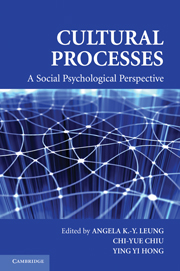Book contents
- Frontmatter
- Contents
- Figures and Tables
- Contributors
- Preface
- Part One Introduction
- Part Two Representational theories of culture
- Part Three Psychological functions of culture
- 5 Epistemic Functions of Culture
- 6 Existential Functions of Culture: The Monumental Immortality Project
- 7 Self-Definitional Functions of Culture
- Part Four Manifestations of cultural processes
- Part Five Transcultural processes
- Index
- References
7 - Self-Definitional Functions of Culture
Published online by Cambridge University Press: 05 June 2012
- Frontmatter
- Contents
- Figures and Tables
- Contributors
- Preface
- Part One Introduction
- Part Two Representational theories of culture
- Part Three Psychological functions of culture
- 5 Epistemic Functions of Culture
- 6 Existential Functions of Culture: The Monumental Immortality Project
- 7 Self-Definitional Functions of Culture
- Part Four Manifestations of cultural processes
- Part Five Transcultural processes
- Index
- References
Summary
In families strongly influenced by Chinese culture, it is not uncommon to find an adult man and his wife living with his parents under the same roof. This behavior can be due to the man's perceived cultural obligation that he needs to take care of his parents while not particularly endorsing the value of filial piety, or the man's genuine endorsement of filial piety as his personal value. Culture has always had a strong influence on human life. It affects the behaviors and attitudes that people display by prescribing culturally approved and proscribing culturally inappropriate ways of conducting the self in specific social settings. This is not the only way that culture affects a person's behavior, however. Culture can exert indirect influence on a person's behavior through the person's self-representations. When a person internalizes a culture's values and beliefs, those values and beliefs become the person's own. People acting out of internalized values and beliefs would display behaviors that are consistent with the cultural norms. Thus, in addition to setting guides for people's life, culture also features in people's definitions of the self.
In this chapter, we examine the role that culture plays in people's self-representations. We present a distinction between cultural knowledge (mind) and cultural self, and discuss the implications of disentangling cultural knowledge and cultural self in furthering work in the area of culture and self, particularly with respect to research on cultural identity. We contend that being experienced with and having knowledge of a culture does not necessarily entail passive internalization of the culture as part of the self. Instead, cultural identity is a product of the dynamic interactions between the individual and the culture as knowledge represented by the individual and by the society. Specifically, we will examine how cultural knowledge provides meaning to the self, the process by which individuals use cultural knowledge to create their own identity, and how cultural knowledge can be used in the affirmation of one's identity.
- Type
- Chapter
- Information
- Cultural ProcessesA Social Psychological Perspective, pp. 111 - 136Publisher: Cambridge University PressPrint publication year: 2010
References
- 3
- Cited by

